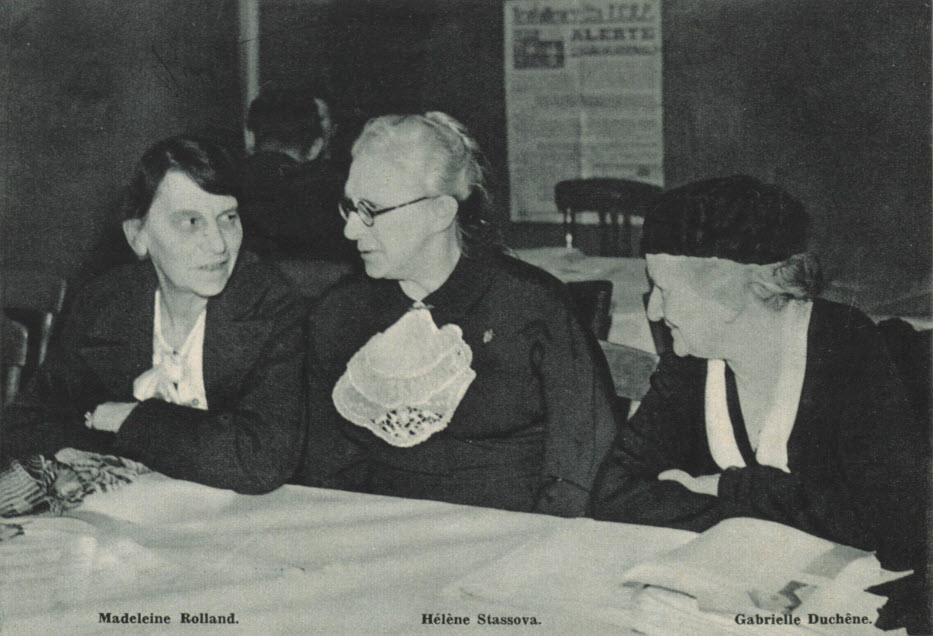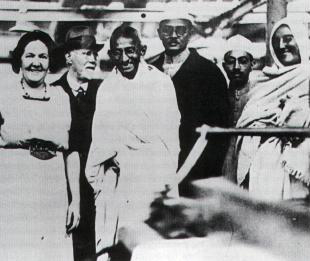|
Madeleine Rolland
Madeleine Rolland (October 17, 1872 – April 1, 1960) was a French translator and peace activist. She was affiliated with the French section of the Women's International League for Peace and Freedom (WILPF). Biography Madeleine Rolland was born in Clamecy, Nièvre, Clamecy, October 17, 1872. She passed the ''Agrégation'' in English in 1901, and then taught in Paris at the Guild (future Franco-British Institute). From 1919, she filled the roles of secretary and interpreter for her brother, Romain Rolland. That same year, she joined WILPF. Rolland was a translator, most notably of ''Tess of the d'Urbervilles'' by Thomas Hardy, but also by Rabindranath Tagore. Passionate about India and mastering the English language, it was Madeleine who made it possible for her brother, Romain, to come into contact with Rabindranath Tagore and Mahatma Gandhi. In addition, she had a rich epistolary correspondence with Mirabehn, Madeleine Slade. She spent the German military administration in ... [...More Info...] [...Related Items...] OR: [Wikipedia] [Google] [Baidu] |
German Military Administration In Occupied France During World War II
The Military Administration in France (german: Militärverwaltung in Frankreich; french: Occupation de la France par l'Allemagne) was an interim occupation authority established by Nazi Germany during World War II to administer the occupied zone in areas of northern and western France. This so-called ' was established in June 1940, and renamed ' ("north zone") in November 1942, when the previously unoccupied zone in the south known as ' ("free zone") was also occupied and renamed ' ("south zone"). Its role in France was partly governed by the conditions set by the Second Armistice at after the success of the leading to the Fall of France; at the time both French and Germans thought the occupation would be temporary and last only until Britain came to terms, which was believed to be imminent. For instance, France agreed that its soldiers would remain prisoners of war until the cessation of all hostilities. The "French State" (') replaced the French Third Republic that had ... [...More Info...] [...Related Items...] OR: [Wikipedia] [Google] [Baidu] |
French Pacifists
French (french: français(e), link=no) may refer to: * Something of, from, or related to France ** French language, which originated in France, and its various dialects and accents ** French people, a nation and ethnic group identified with France ** French cuisine, cooking traditions and practices Fortnite French places Arts and media * The French (band), a British rock band * "French" (episode), a live-action episode of ''The Super Mario Bros. Super Show!'' * ''Française'' (film), 2008 * French Stewart (born 1964), American actor Other uses * French (surname), a surname (including a list of people with the name) * French (tunic), a particular type of military jacket or tunic used in the Russian Empire and Soviet Union * French's, an American brand of mustard condiment * French catheter scale, a unit of measurement of diameter * French Defence, a chess opening * French kiss, a type of kiss involving the tongue See also * France (other) * Franch, a surname * Frenc ... [...More Info...] [...Related Items...] OR: [Wikipedia] [Google] [Baidu] |
People From Nièvre
A person ( : people) is a being that has certain capacities or attributes such as reason, morality, consciousness or self-consciousness, and being a part of a culturally established form of social relations such as kinship, ownership of property, or legal responsibility. The defining features of personhood and, consequently, what makes a person count as a person, differ widely among cultures and contexts. In addition to the question of personhood, of what makes a being count as a person to begin with, there are further questions about personal identity and self: both about what makes any particular person that particular person instead of another, and about what makes a person at one time the same person as they were or will be at another time despite any intervening changes. The plural form "people" is often used to refer to an entire nation or ethnic group (as in "a people"), and this was the original meaning of the word; it subsequently acquired its use as a plural form of p ... [...More Info...] [...Related Items...] OR: [Wikipedia] [Google] [Baidu] |
1960 Deaths
Year 196 ( CXCVI) was a leap year starting on Thursday (link will display the full calendar) of the Julian calendar. At the time, it was known as the Year of the Consulship of Dexter and Messalla (or, less frequently, year 949 '' Ab urbe condita''). The denomination 196 for this year has been used since the early medieval period, when the Anno Domini calendar era became the prevalent method in Europe for naming years. Events By place Roman Empire * Emperor Septimius Severus attempts to assassinate Clodius Albinus but fails, causing Albinus to retaliate militarily. * Emperor Septimius Severus captures and sacks Byzantium; the city is rebuilt and regains its previous prosperity. * In order to assure the support of the Roman legion in Germany on his march to Rome, Clodius Albinus is declared Augustus by his army while crossing Gaul. * Hadrian's wall in Britain is partially destroyed. China * First year of the '' Jian'an era of the Chinese Han Dynasty. * Emperor ... [...More Info...] [...Related Items...] OR: [Wikipedia] [Google] [Baidu] |
1872 Births
Year 187 ( CLXXXVII) was a common year starting on Sunday (link will display the full calendar) of the Julian calendar. At the time, it was known as the Year of the Consulship of Quintius and Aelianus (or, less frequently, year 940 ''Ab urbe condita''). The denomination 187 for this year has been used since the early medieval period, when the Anno Domini calendar era became the prevalent method in Europe for naming years. Events By place Roman Empire * Septimius Severus marries Julia Domna (age 17), a Syrian princess, at Lugdunum (modern-day Lyon). She is the youngest daughter of high-priest Julius Bassianus – a descendant of the Royal House of Emesa. Her elder sister is Julia Maesa. * Clodius Albinus defeats the Chatti, a highly organized German tribe that controlled the area that includes the Black Forest. By topic Religion * Olympianus succeeds Pertinax as bishop of Byzantium (until 198). Births * Cao Pi, Chinese emperor of the Cao Wei st ... [...More Info...] [...Related Items...] OR: [Wikipedia] [Google] [Baidu] |
List Of Peace Activists
This list of peace activists includes people who have proactively advocated diplomatic, philosophical, and non-military resolution of major territorial or ideological disputes through nonviolent means and methods. Peace activists usually work with others in the overall anti-war and peace movements to focus the world's attention on what they perceive to be the irrationality of violent conflicts, decisions, and actions. They thus initiate and facilitate wide public dialogues intended to nonviolently alter long-standing societal agreements directly relating to, and held in place by, the various violent, habitual, and historically fearful thought-processes residing at the core of these conflicts, with the intention of peacefully ending the conflicts themselves. A * Dekha Ibrahim Abdi (1964–2011) – Kenyan peace activist, government consultant * David Adams (born 1939) – American author and peace activist, task force chair of the United Nations International Year for t ... [...More Info...] [...Related Items...] OR: [Wikipedia] [Google] [Baidu] |
Créteil
Créteil () is a commune in the southeastern suburbs of Paris, Île-de-France. It is located from the centre of Paris. Créteil is the '' préfecture'' (capital) of the Val-de-Marne department as well as the seat of the Arrondissement of Créteil. The city is, moreover, the seat of a Roman Catholic diocese and of one of France's 30 nationwide ''académies'' (districts) of the Ministry of National Education. Name The name Créteil was recorded for the first time as ''Cristoilum'' in the martyrology written by a monk named Usuard in 865. The name ''Cristoilum'' is made of the Celtic word ''ialo'' (meaning "clearing, glade", "place of") suffixed to a pre-Latin radical ''crist-'' whose meaning is still unclear. Some believe ''crist'' is a Celtic word meaning "ridge", a cognate of Latin ''crista'' and modern French ''crête'', in which case the meaning of ''Cristoilum'' would be "clearing on the ridge" or "place on the ridge." A more traditional etymology was that ''crist ... [...More Info...] [...Related Items...] OR: [Wikipedia] [Google] [Baidu] |
Liberation Of France
The liberation of France in the Second World War was accomplished through diplomacy, politics and the combined military efforts of the Allied Powers, Free French forces in London and Africa, as well as the French Resistance. Nazi Germany invaded France in May 1940. Their rapid advance through the undefended Ardennes caused a crisis in the French government; the French Third Republic dissolved itself in July, and handed over absolute power to Marshal Philippe Pétain, an elderly hero of World War I. Pétain signed an armistice with Germany with the north and west of France under German military occupation. Pétain, charged with calling a Constitutional Authority, instead established an authoritarian government in the spa town of Vichy, in the southern '' zone libre'' ("free zone"). Though nominally independent, Vichy France became a collaborationist regime and was little more than a Nazi client state that actively participated in Jewish deportations. Even before France s ... [...More Info...] [...Related Items...] OR: [Wikipedia] [Google] [Baidu] |
Dijon
Dijon (, , ) (dated) * it, Digione * la, Diviō or * lmo, Digion is the prefecture of the Côte-d'Or department and of the Bourgogne-Franche-Comté region in northeastern France. the commune had a population of 156,920. The earliest archaeological finds within the city limits of Dijon date to the Neolithic period. Dijon later became a Roman settlement named ''Divio'', located on the road between Lyon and Paris. The province was home to the Dukes of Burgundy from the early 11th until the late 15th centuries, and Dijon became a place of tremendous wealth and power, one of the great European centres of art, learning, and science. The city has retained varied architectural styles from many of the main periods of the past millennium, including Capetian, Gothic, and Renaissance. Many still-inhabited town-houses in the city's central district date from the 18th century and earlier. Dijon's architecture is distinguished by, among other things, '' toits bourguignon ... [...More Info...] [...Related Items...] OR: [Wikipedia] [Google] [Baidu] |
Mirabehn
Madeleine Slade (22 November 1892 – 20 July 1982), also known as Mirabehn or Meera Behn, was a British supporter of the Indian Independence Movement who in the 1920s left her home in England to live and work with Mahatma Gandhi. She devoted her life to human development and the advancement of Gandhi's principles. She was the daughter of the British Rear-Admiral Sir Edmond Slade and Florence Madeleine, eldest daughter of Mr James Carr Saunders of Milton Heath, Dorking (but born in Reigate, Surrey in 1870). Sir Edmund and his wife also had another daughter, Madeline's sister Rhona. Early life Mirabehn was born into a well connected British family in 1892. Her father, Sir Edmond Slade was an officer in the Royal Navy who was posted in Mirabehn's early years as the Commander-in-Chief of the East Indies Squadron, later becoming director of the Naval Intelligence Division. She spent much of her childhood with her maternal grandfather who owned a large country estate and was fr ... [...More Info...] [...Related Items...] OR: [Wikipedia] [Google] [Baidu] |


_1938.jpg)



